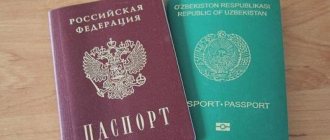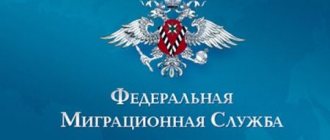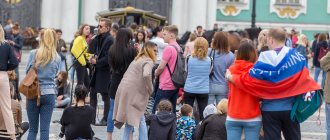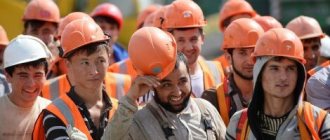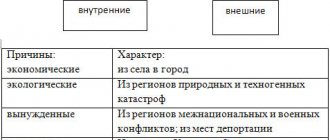Migration through the eyes of local residents
Recently, Russians have begun to feel concerned about the increase in the number of foreigners.
According to the World Bank, Russia ranks second in the world in terms of the number of migrants.
In the future, the number of visitors from other countries is expected to increase. What are our compatriots afraid of? Typically this is:
- increase in crime. Among the dangers associated with migration, we can list the illegal use of funds, the import of weapons, terrorism;
- drug smuggling;
- increase in unemployment among the local population. Considering that 1/3 of the jobs in Moscow are occupied by migrants, we can conclude that they have taken jobs away from local residents. However, it is not migrants who are to blame for this, but dishonest employers who prefer to hire illegal immigrants: they do not require sick pay and are ready to work seven days a week for a lower salary than locals;
- spread of diseases;
- threat to Russian identity.
Regardless of how justified these fears are, sociologists have noted an increase in negative attitudes towards migrants. Surveys conducted by the research organization Levada Center revealed: in 1994, the opinion “Russia is for Russians” was shared by 13% of respondents, and 20 years later their number reached 66%.
The problem of migrants' rights
Since the end of the 20th century, in many countries the discrepancy between the increasingly complex nature of migrant flows and established legal and institutional systems responsible for migration processes has become increasingly apparent.
In the field of migration, international instruments have been reassessed. Research has shown that government agencies in most regions of the world do not sufficiently ensure the rights of migrants, which is due to the increase in manifestations of discrimination, racism, xenophobia, humiliating and inhumane attitudes towards migrants.
In many countries, international migration leads to:
- loss of human and labor resources,
- development of socio-political tensions,
- economic crisis.
In 1997, the UN Commission on Human Rights created a Working Group of Experts on the Rights of Migrants and appointed a Special Rapporteur on the rights of migrants. Their main task: to collect all information about existing problems and obstacles in the comprehensive and effective protection of the human rights of migrants, to develop and implement measures for the implementation, protection and promotion of the rights of migrants.
Finished works on a similar topic
- Course work Problems of population migration 460 rub.
- Abstract Problems of population migration 250 rub.
- Test work Problems of population migration 230 rub.
Get completed work or specialist advice on your educational project Find out the cost
In many countries, both government representatives and society believe that protecting the human rights of migrants is not a serious need, in contrast to respecting the human rights of their own citizens. In these countries, anti-immigrant sentiments prevail, and migrants are assigned a lower social and legal status.
A particular problem is the recognition of the rights of migrants who do not have appropriate documents. In such cases, government authorities perceive the recognition of migrants' human rights as undermining the state's right to implement and ensure the rule of law. This becomes most important in cases where the fight against illegal migration takes a priority role in government programs.
Migration from the authorities' point of view
The country's authorities admit that the current policy (not only regarding external, but also internal migration) has caused problems of labor migration in Russia, including:
- Poor regulation of internal migration.
- Violation of the demographic balance.
- Outflow of funds from the treasury.
- Blurring the boundaries of Russian socio-cultural values.
- Influx of unskilled labor.
- The growth of cheap labor, which hinders the process of preparing our own labor reserves.
- Exacerbation of relations between representatives of different nationalities and religions.
It is impossible not to mention the difficulties of statistical accounting. Despite the efforts of government institutions, the migration statistics system has not yet been streamlined. Migration service databases do not contain complete information on the number of arrivals and departures from the country.
But will the problems of population migration really cause difficulties in the Russian economy? Does the country need labor migrants?
Ways to solve problems
Despite the crisis, Russia attracts workers from other countries and foreign investment. Depending on the organization of the process, migration can be either profitable or unprofitable. To solve migration problems in Russia and make cooperation mutually beneficial, it is necessary to take care of creating acceptable conditions for migrants and help them obtain official work permits. It is equally important to formulate a list of in-demand professions and improve statistical methods.
In general, the influx of migrants is beneficial to Russia, because they produce up to 12% of the country’s GDP.
Both employers and many institutions benefit from the labor of migrants: banks, telephone operators, airlines, etc. In addition, newcomers are ready to do hard physical work that does not attract local residents.
Life “No one will help me”: How refugees and migrants are surviving the pandemic in Russia
There is no point in expecting that leaving quarantine will solve the problem. Migrants and refugees will have an even harder time coping with the economic fallout from the pandemic. The current crisis in Russia is already being called the worst in the last ten years, unemployment has risen to the highest level in the last four years, and GDP may decline by 5% by the end of the year. The value of jobs will rise, and this will directly affect the availability of work for migrant workers, who already most often work in low-paid jobs. Moreover, some government officials in the regions are already proposing to enshrine labor discrimination in law.
Consulates and embassies in Russia help citizens of their countries, but their resources are also limited: diplomats cannot solve everyone’s problems at once. The Tajik authorities have promised to take away from the Russian Federation citizens who remained in temporary detention centers, but many temporary migrants live in hostels or apartments, and Tajik officials also understand this. The same can be said about citizens of Kyrgyzstan: the local embassy recently urged people not to believe information about the sale of tickets for the Moscow-Bishkek flight, because only those people whose names appear on the embassy lists will be able to fly to their homeland. The authorities help those who remain in Russia with housing, money and even food - but this help is often not enough.
Charitable foundations that deal with the problems of migrants and refugees also help - they now need not only money, but also food, hygiene products, clothing and other everyday things. “We help with food and, in acute situations, with money. If a person is already on the street, we help them find temporary housing. We paid for a hostel for a month for several people, sometimes we manage to find some other options. For example, one of the Moscow hotels agreed to accommodate free of charge during the epidemic several migrants who found themselves on the street,” said Ekaterina Rosolovskaya.
Our interlocutors say that now they can no longer do anything - and only hope that the pandemic will end soon. “Now I rely only on my own strength: I don’t expect help from anyone, no one will help me,” says Aizat. “I don't know what the future will be, but I hope to find a job,” Jennifer says. — I want my daughter to be able to study in Russia. “I pray that the epidemic ends as soon as possible because I live in fear every day.”
You can help by making a one-time or regular donation to Civic Assistance or other funds that deal with the problems of migrants and refugees. There are different types of help needed, you can find out more about it at this link.
Photos: Areaware
Internal migration
Difficulties with the arrival of workers from abroad complement the problems of interregional migration in modern Russia. There has been a tendency for residents of the northern part of the country, Siberia and the Far East to move to the central and southern regions. Demographers called this phenomenon “Western drift.” More than 66% of migrants moved to the Central Federal District, while the migration balance of the remaining districts approached zero.
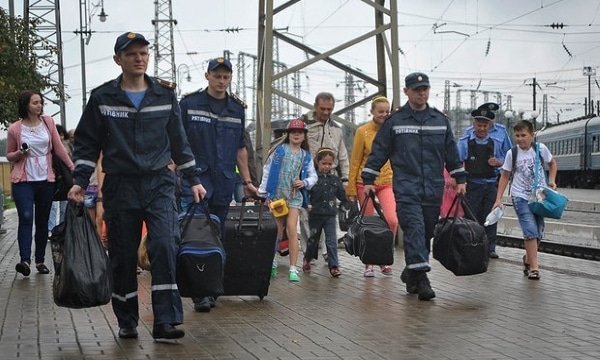
Will this problem be solved? It is not yet known how to stop this drift to the west. Everyone wants to live in cities with high economic potential and developed social infrastructure, which is why they are drawn to the Moscow and St. Petersburg agglomerations.
Almost the entire increase (more than 90%) in internal migration relates to 10 regions of the country, with 54% of internal migrants settling in Moscow and the region. The remaining regions of Russia are only losing population.
How many labor migrants are there in Russia now?
Until March 30, 2021, entry into the country was open. The Ministry of Internal Affairs attempted to count the number of legal migrants stuck in the Russian Federation in April. We counted according to existing patents - it came out to 2.5 million. Of them:
- citizens of Ukraine - 89.2 thousand,
- citizens of Tajikistan - 507 thousand,
- citizens of Uzbekistan - 1 million 14.5 thousand.
It turned out to be more difficult with citizens of Kyrgyzstan - after all, they do not need patents. But judging by the notifications and contracts from employers of Kyrgyz citizens in the Russian Federation at that time there were 353.2 thousand.
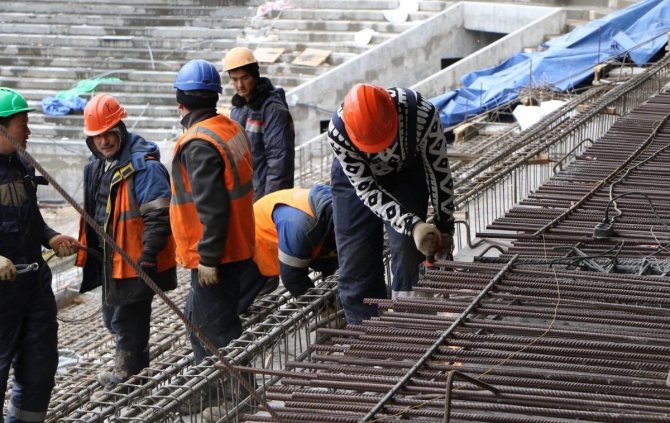
In the construction field, foreign workers can make up up to 80% of an organization's total employees. PHOTO: nn.ru
However, this information cannot be considered complete. According to updated data from the Ministry of Internal Affairs of the Russian Federation, for the period from January to June of this year, 5,328,887 people were registered for migration in the country. And half a million less were deregistered - 4,758,553. At the same time, 1,534,429 people indicated work for entry purposes, 649,145 received patents (for comparison: in the same period last year, 1,024,451 foreigners received patents), and work permits — 24,862 (compared to 60,082 in 2021).
In addition, to the total number of migrants we can add those who have been living here for several years under a temporary residence permit - 338,499. A residence permit almost equates the legal status of foreigners with Russians, but, in general, they can also be classified as migrants. There are 620,974 people with a residence permit for January-June 2021 in Russia.
- Migrants in Russia
Putin’s new Decree for migrants: residence permits, temporary residence permits, registrations were “frozen” until September 15, and work without a patent was prohibited
- Elena Voropaeva
- 15.06.2020
After the borders were closed, Russian President Vladimir Putin signed Decree No. 274 and Decree No. 392 concerning the rights of foreigners remaining in Russia. The first of them extended the validity of registrations, patents, temporary residence permits and residence permits, the terms of which were expiring, until June 15. The second decree made adjustments to this date, extending it until September 15, but clarifying that patents still need to be renewed. For some foreigners, this news was a real blessing. However, it did not make things any easier for those who lost their homes and jobs. A tent camp in the Samara region, founded by citizens of Uzbekistan, Kyrgyzstan and Tajikistan who tried to return home through Kazakhstan, is just one piece of evidence. The authorities of the republics tried to organize transport corridors from May to August. According to media reports, since the beginning of the pandemic the following have returned to their homeland:
- to Moldova - over 400 thousand people.
- in Uzbekistan - about 498 thousand people.
- There are about 90 thousand people in Tajikistan.
- to Kyrgyzstan - over 20 thousand people.
Global picture
Globalization leads to the movement of funds and human resources. Huge flows of migrants from poor countries or states with crisis economies are looking for a better life in prosperous places. The UN reported that the total number of migrants in the world has exceeded 230 million. Migration problems in the modern world are of such concern to the world community that many countries consider demography and effective migration policy to be their national security priorities.
Restricting migration is not the best solution. An organized and controlled process can have a positive impact on both donor and receiving countries.
Migration promotes the exchange of skills, cultural enrichment, and contributes to the development of the country's economy.
To curb the flow of migrants, prohibitive measures are not enough, which usually lead to an increase in illegal migration. Instead, it is necessary to promote the development of supplier countries: invest money in education, medicine, and information technology.
Solving the problem within the EU, and even more so at the international level, is not easy. Some countries believe that migration issues are solely a national responsibility. However, the best way out is to join forces at all levels.
Educational project “Problems of migration in modern Russia and ways to solve them”
MAOU multidisciplinary lyceum No. 20, Ulyanovsk
Problems of migration in modern Russia and ways to solve them
Project author: 10th grade student B
Abdullin Denis
Scientific adviser:
history and social studies teacher
Alekseeva Olga Dmitrievna
Introduction
The study of migration processes is of great importance in the 21st century, when radical historical changes are taking place, entailing unprecedented social upheavals, economic crises and changes in political forces. In addition, spatial movements are beginning to play an increasingly prominent role in the life of not only entire societies, but also in the life of an individual. This determines the relevance of studying migration processes, their nature, causes and directions in a historical context.
Migration processes often lead to a disruption of the historically established national and cultural balance in different countries, and also create conflicts and give rise to contradictions between states. Migration in the modern world is becoming a challenge and threat to the security of individual states and society.
Object
The research of this work is the problems of migration processes occurring in the Russian Federation.
Subject of study
— features of the migration situation in modern Russia.
Hypothesis
— the inevitability of the migration process as a social phenomenon.
Goals of work:
analysis of migration processes in Russia, identification of problems in the field of external and internal migration of the population and possible solutions to them.
1. Concept and classification of migrations
1.1 Interpretation of the concept of “migration”
Population migration (from the Latin migratio - relocation) is usually understood as the territorial mobility of the population associated with its movement across the territory of the country (or between states), caused, as a rule, by the influence of various factors - socio-economic, military-political, religious, natural , environmental; features of the historical and economic development of individual regions and countries.
The signs of migration include functional, according to which it can be divided into labor, cultural and everyday life, recreational, and business trips.
Based on time, temporary (return) and permanent (irreturn) migration are distinguished.
Based on the direction of migration flows, they are divided into external (intercontinental and interstate) and internal (interdistrict, intradistrict).
According to the form of organization, population migration is divided into organized, that is, carried out with the participation and assistance of the state, and unorganized (amateur).
1.2 Impact of migration
Population migration is not only a simple mechanical movement of people, but also a complex social process that affects many aspects of the socio-economic and cultural life of entire nations.
First of all, migrations have a great impact on demographic processes.
Migration contributes to the territorial redistribution of population and labor resources and affects the level of socio-economic development of regions.
The composition of migrants influences the social structure, cultural and educational level of the population.
2. Migration in Russia
2.1. Internal migration in Russia
The territorial organization of society that emerged during the Soviet period, in accordance with the political and economic model of that period, could not meet the requirements of the new market economy and the new federal state structure.
The centrally planned distribution of economic potential throughout the country has been replaced by a process regulated by the laws of the market, the natural tendency of production (and economic activity) to where for a successful market economy there are the most favorable natural resource prerequisites, transport accessibility, proximity to sales markets, and the benefits of geographical location .
In this regard, a fundamentally new territorial environment has emerged in Russia, which has no analogues either abroad or in the recent domestic past, characterized by a unique number, content and severity of regional problems.
Let us consider these migration processes using the example of the Ulyanovsk region.
The low economic attractiveness of the Ulyanovsk region is caused by low salaries and living standards. The main reason is the prolonged recession in the economy: the city-forming factories that concentrate most of the people employed in production have ceased to function.
Thousands of young people are leaving the Ulyanovsk region; this situation is certainly alarming. In the context of a demographic crisis, population decline and labor shortages, migration is an important area of the region’s personnel policy. The shortage of labor resources today has become one of the factors hindering the development of the economic potential of the Ulyanovsk region.
Recently, the government of the Ulyanovsk region has been trying to improve the situation and is attracting investors in order to provide residents of the region with jobs and develop the region.
In his blog, the governor of the Ulyanovsk region S.I. Morozov emphasized: “Since the beginning of 2012, there has been a positive trend in the socio-economic development of the Ulyanovsk region. Today we can proudly say that our region is one of the leaders in the Volga Federal District in terms of development rates. This worthy result was made possible thanks to our joint efforts.”
2.2. Modern external migration in Russia: state and features
Despite the more than ten-year history of post-Soviet Russia’s involvement in the international labor market, the foundations of civilized, organized labor migration in the country are just beginning to take shape; regulation and control of international flows of workers has not yet acquired the character of a well-thought-out state migration policy.
First of all, this is expressed in huge flows of uncontrolled labor migration, which, according to some estimates, exceed the official scale of migration by tens of times.
Illegal immigration carries a number of real and potential threats, serving as a breeding ground for the shadow economy. The negative aspects of this category of migration include tax evasion, aggravation of the crime situation (according to the Ministry of Internal Affairs, almost half of all crimes in the country are committed by foreigners), and the outflow of significant financial resources to the migrant’s country of permanent residence.
Another pressing problem is the uneven distribution of immigrants throughout the country.
A number of powerful centers of population attraction have formed in Russia, the leading role among which belongs to Moscow and the Moscow region. Moreover, flows of migrants from abroad are sent to the same already densely populated regions as internal migrants, while most other Russian regions are experiencing a shortage of workers.
3. The mechanism for regulating modern migration policy on the territory of the Russian Federation.
Features of the development of the migration situation in the Russian Federation in the last decade are due to political and socio-economic changes. In these conditions, the Russian government is forming an active migration policy, for the implementation of which the country adopted the “Concept for regulating migration processes in the Russian Federation.” Its development was initiated by the Federal Migration Service of Russia. One of its main tasks is to regulate migration processes in the Russian Federation and combat illegal migration.
President of the Russian Federation V.V. Putin emphasized that “Russia is not going to close itself off from anyone” and called for “an order of magnitude strengthening of the requirements for the quality of migration policy, including the regulation of labor migration.” Russia, he noted, “should not be a country where anyone can enter, however they want, at any time.” “We need coordinated work of the migration service, law enforcement agencies, primarily the Ministry of Internal Affairs of Russia and the FSB, regions, and of course, business, including in order to clearly understand how many people and what professions are required in this or that subject of the Russian Federation,” he explained . In turn, I believe that the problem of the outflow of the local population from the regions can be solved by implementing a set of measures, both in the economic and social-labor spheres. I am confident that one of the priority areas is the development of regional labor markets through the development of regional employment policies that take into account the specifics of local development.
It should be noted that for any territory (subject of the Russian Federation, city, village), the greatest interest is represented by such economic objects whose activities:
- increases the income of the working population;
- creates additional jobs;
- increases the revenue side of the budget;
- reduces the need for budget financing for the maintenance and repair of housing and other social facilities, landscaping, etc.;
- reduces negative impact on the environment;
- improves the demographic situation;
- reduces the level of prices and tariffs for goods and services produced in the region.
Thus, the role and importance of state migration policy in our country is increasing significantly, which implies the need for a comprehensive solution to the problems of external and internal migration of the population.
Bibliography
1) Andreev E.M., Vishnevsky A.G., Mkrtchyan N.V. and others. Prospects for migration and ethnic development of Russia and their consideration when developing strategic directions for the country’s development for the long term. - M.: IET, 2004. P. 43-44.
2) Ignatov V.G., Butov V.I. Regional studies: economics and management. M., Rostov n/D., 2004. P. 265.
3) Zayonchkovskaya Zh.A., Mkrtchyan N.V. Internal migration in Russia: legal practice. - M., 2007. P. 24-26.
4) Smidovich S.G. Problems of regulating migration in Moscow // Migration processes: The past. The present. Future. Sat. materials of the X and XI Moscow-Berlin international seminars. - M., 2005. P. 37.
About problems with labor migration
Labor migrant Aizat came to Moscow from Kyrgyzstan at the end of 2021 with her husband - he persuaded her to move. She also learned about real life in Russia through him, but, according to her, her first impressions of the country were mixed. Everything seemed interesting, and I was overwhelmed with emotions, but, on the other hand, there was fear - how to live further and what I would have to face.
Labor contracts with migrants are concluded extremely rarely. Naturally, it is very easy to fire or send such a person on vacation. It is not protected in any way, and to prove that an employment relationship took place, you need to go to court. Aizat was looking for work on the Internet, and since she had almost no acquaintances in Moscow, she had to rely only on her own strength. The husband was already working and did not have time to help Aizat much in her search.

“I found a job in about two weeks. I have often heard that there are a lot of scammers in Moscow. There are also our compatriots who throw money at those who have just arrived in the country. Intermediaries who “eat up money” or delay payment. Of course, I also found myself in such situations. I worked in a cafe, where at first my salary was delayed, and then they simply stopped paying me. I had to quit - and even sued them. In another place, money was also detained and refused to be paid, but the conflict was resolved peacefully,” recalls Aizat.
Moreover, many constantly face disdainful attitudes and do not believe that justice can be achieved. And this makes it difficult to make their communication with employers safe.
“I would like migrants to be treated like people and to begin to feel more confident. They understood that if they were not paid their salaries, they should not be afraid to contact the police. If they were seen not as criminals, but as those whose rights need to be protected, then migrants themselves would try to achieve justice. This would balance their power in relation to employers, who often take advantage of the position of people whose interests no one wants to protect,” says Varvara Tretyak.
